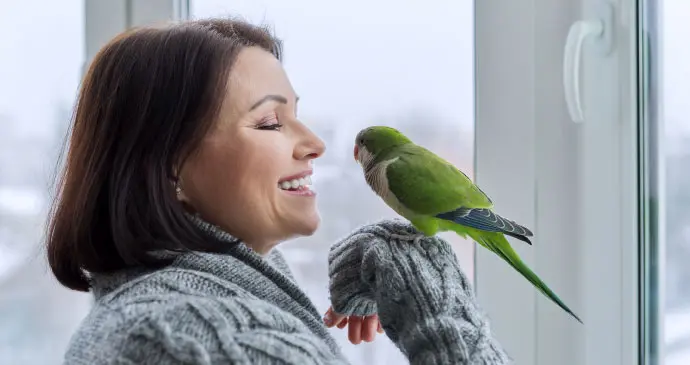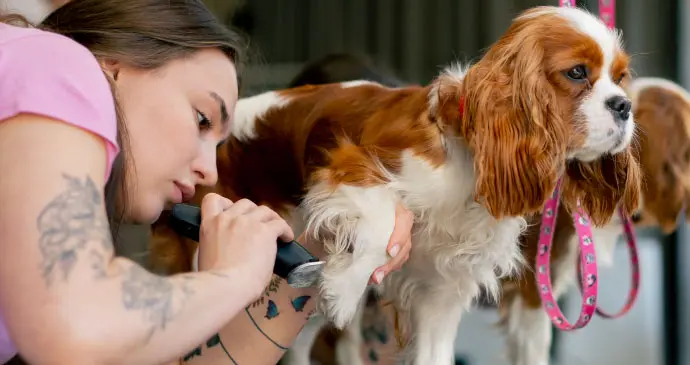Find opportunities in the data!
The American Pet Products Association (APPA) released the 2024 Bird, Small Animal & Horse Report: Strategic Insights from the National Pet Owners Survey.
It provides an in-depth analysis of owner behaviors, shopping trends, and pet care priorities in those niche ownership areas, revealing significant shifts in how bird, small animal, and horse owners live with and care for their pets.
Below, we’re listing key findings from the survey and thoughts about how your practice might benefit from the uncovered trends.

Find opportunities in the data!
The American Pet Products Association (APPA) released the 2024 Bird, Small Animal & Horse Report: Strategic Insights from the National Pet Owners Survey.
It provides an in-depth analysis of owner behaviors, shopping trends, and pet care priorities in those niche ownership areas, revealing significant shifts in how bird, small animal, and horse owners live with and care for their pets.
Below, we’re listing key findings from the survey and thoughts about how your practice might benefit from the uncovered trends.

Finding 1 - Pet owners are developing deeper bonds with their animals.
89% of small animal owners now purchase gifts for their pets, up from 75% in 2018.
76% of bird owners purchase gifts, an increase from 69% in 2018.
71% of horse owners now buy gifts for their pets, a dramatic rise from 31% in 2018.
52% of small animal owners purchase a gift for Christmas, and 46% buy a gift for their pet on their pet’s birthday, up from 25% and 20% in 2018, respectively.
Most bird owners purchase gifts for their pets on at least one occasion, with birthdays and Christmas seeing notable growth in popularity.
Most horse owners purchase gifts for their pets on at least one occasion, with Christmas seeing significant growth in popularity.
What this data means for veterinary professionals
Strengthening the human-animal bond
The rise in gift-giving reflects a deeper emotional connection between pet owners and their animals. As veterinarians and vet techs, you can leverage this insight to encourage owners to view health care and wellness as a meaningful gift for their pets. Suggest wellness packages or preventive care services as thoughtful ways for owners to demonstrate their love.
Opportunities for education
Use this trend to educate clients about gifts that promote health and well-being. For instance, you could recommend enrichment toys for birds and small animals that encourage natural behaviors, or therapeutic gear like cooling blankets and hoof care products for horses.
Understanding pet owner motivation
The data suggests that owners increasingly humanize their pets, celebrating milestones like birthdays and including them in holiday traditions. This perspective aligns with a willingness to invest in quality care and products, emphasizing the importance of a strong partnership between veterinary professionals and pet owners.
Broadening your offerings
If your clinic or practice has retail opportunities, consider stocking popular or high-value gift items such as species-specific treats, enrichment tools, or seasonal accessories. Clients will appreciate the convenience of purchasing these items from a trusted source.
Seasonal promotions
Consider creating seasonal promotions or campaigns around holidays and pet birthdays. For example, you could offer discounts on wellness checks or sell curated gift bundles featuring products like dental chews, supplements, or grooming tools
Tailoring conversations
With nearly 90% of small animal owners and over 70% of bird and horse owners buying gifts, conversations with pet owners can include personalized recommendations. Discuss how specific toys, treats, or accessories align with the pet’s health and happiness needs.
What might this mean for the future?
As gifting grows, it could extend to proactive health measures like vaccines, parasite prevention, or grooming services. Encouraging this mindset can positively impact long-term pet health.
Also, the normalization of gifting to pets reflects broader societal shifts in how animals are viewed, with pets being increasingly thought of as family members. Veterinary practices that recognize and respect this perspective will likely see stronger client relationships.

Finding 1 - Pet owners are developing deeper bonds with their animals.
89% of small animal owners now purchase gifts for their pets, up from 75% in 2018.
76% of bird owners purchase gifts, an increase from 69% in 2018.
71% of horse owners now buy gifts for their pets, a dramatic rise from 31% in 2018.
52% of small animal owners purchase a gift for Christmas, and 46% buy a gift for their pet on their pet’s birthday, up from 25% and 20% in 2018, respectively.
Most bird owners purchase gifts for their pets on at least one occasion, with birthdays and Christmas seeing notable growth in popularity.
Most horse owners purchase gifts for their pets on at least one occasion, with Christmas seeing significant growth in popularity.
What this data means for veterinary professionals
Strengthening the human-animal bond
The rise in gift-giving reflects a deeper emotional connection between pet owners and their animals. As veterinarians and vet techs, you can leverage this insight to encourage owners to view health care and wellness as a meaningful gift for their pets. Suggest wellness packages or preventive care services as thoughtful ways for owners to demonstrate their love.
Opportunities for education
Use this trend to educate clients about gifts that promote health and well-being. For instance, you could recommend enrichment toys for birds and small animals that encourage natural behaviors, or therapeutic gear like cooling blankets and hoof care products for horses.
Understanding pet owner motivation
The data suggests that owners increasingly humanize their pets, celebrating milestones like birthdays and including them in holiday traditions. This perspective aligns with a willingness to invest in quality care and products, emphasizing the importance of a strong partnership between veterinary professionals and pet owners.
Broadening your offerings
If your clinic or practice has retail opportunities, consider stocking popular or high-value gift items such as species-specific treats, enrichment tools, or seasonal accessories. Clients will appreciate the convenience of purchasing these items from a trusted source.
Seasonal promotions
Consider creating seasonal promotions or campaigns around holidays and pet birthdays. For example, you could offer discounts on wellness checks or sell curated gift bundles featuring products like dental chews, supplements, or grooming tools
Tailoring conversations
With nearly 90% of small animal owners and over 70% of bird and horse owners buying gifts, conversations with pet owners can include personalized recommendations. Discuss how specific toys, treats, or accessories align with the pet’s health and happiness needs.
What might this mean for the future?
As gifting grows, it could extend to proactive health measures like vaccines, parasite prevention, or grooming services. Encouraging this mindset can positively impact long-term pet health.
Also, the normalization of gifting to pets reflects broader societal shifts in how animals are viewed, with pets being increasingly thought of as family members. Veterinary practices that recognize and respect this perspective will likely see stronger client relationships.
Finding 2 - Owners are making greater provisions for their pets’ futures.
62% of bird owners and 63% of small animal owners have or plan to make provisions in their wills, up from 52% and 54% respectively in 2018.
70% of horse owners maintain consistent long-term planning for their pets.
What does this mean for vets like you?
Pet longevity and care needs
The increase in long-term planning highlights how owners are becoming more mindful of their pets' extended care. For veterinary professionals, this is an opportunity to emphasize the importance of ongoing health management. Discuss the benefits of regular check-ups, preventive care, and aging-related services to ensure pets stay healthy over their lifespan.
Engaging in estate planning conversations
While discussing estate planning might seem unrelated to veterinary care, it reflects a deeper emotional and financial investment in pets. Veterinarians and vet techs can gently introduce this topic by providing educational resources or partnering with legal experts who specialize in pet-inclusive estate planning.
Reinforcing the role of veterinary teams in long-term health
As owners plan for their pets' futures, they may also seek guidance on how to prepare for medical emergencies or chronic health conditions. By offering detailed wellness plans or helping clients budget for future healthcare needs, you position your practice as a trusted partner in long-term care.
Encouraging emergency preparedness
Highlight the importance of planning not just for the long-term, but for unexpected situations like natural disasters or sudden owner incapacitation. Recommend tools like pet identification systems, emergency care kits, or temporary care arrangements with trusted individuals.
What might this mean for the future?
With provisions in wills becoming more common, there may be an increase in pet trusts or legal structures that ensure pets are cared for financially after their owner’s passing. Veterinary clinics could explore offering guidance or partnering with estate planning services to help owners navigate these options.
For horses and other long-living animals, consistent long-term planning may lead to growth in demand for retirement facilities or sanctuary services. Veterinary professionals can assist clients by recommending reputable organizations or services for aging or rehomed pets.
Owners planning for their pets’ futures are likely to be proactive about their care, making them more receptive to recommendations for wellness and preventative services. Tailoring your communication to meet these clients' goals can lead to stronger trust and engagement.

Finding 2 - Owners are making greater provisions for their pets’ futures.
62% of bird owners and 63% of small animal owners have or plan to make provisions in their wills, up from 52% and 54% respectively in 2018.
70% of horse owners maintain consistent long-term planning for their pets.
What does this mean for vets like you?
Pet longevity and care needs
The increase in long-term planning highlights how owners are becoming more mindful of their pets' extended care. For veterinary professionals, this is an opportunity to emphasize the importance of ongoing health management. Discuss the benefits of regular check-ups, preventive care, and aging-related services to ensure pets stay healthy over their lifespan.
Engaging in estate planning conversations
While discussing estate planning might seem unrelated to veterinary care, it reflects a deeper emotional and financial investment in pets. Veterinarians and vet techs can gently introduce this topic by providing educational resources or partnering with legal experts who specialize in pet-inclusive estate planning.
Reinforcing the role of veterinary teams in long-term health
As owners plan for their pets' futures, they may also seek guidance on how to prepare for medical emergencies or chronic health conditions. By offering detailed wellness plans or helping clients budget for future healthcare needs, you position your practice as a trusted partner in long-term care.
Encouraging emergency preparedness
Highlight the importance of planning not just for the long-term, but for unexpected situations like natural disasters or sudden owner incapacitation. Recommend tools like pet identification systems, emergency care kits, or temporary care arrangements with trusted individuals.
What might this mean for the future?
With provisions in wills becoming more common, there may be an increase in pet trusts or legal structures that ensure pets are cared for financially after their owner’s passing. Veterinary clinics could explore offering guidance or partnering with estate planning services to help owners navigate these options.
For horses and other long-living animals, consistent long-term planning may lead to growth in demand for retirement facilities or sanctuary services. Veterinary professionals can assist clients by recommending reputable organizations or services for aging or rehomed pets.
Owners planning for their pets’ futures are likely to be proactive about their care, making them more receptive to recommendations for wellness and preventative services. Tailoring your communication to meet these clients' goals can lead to stronger trust and engagement.
Finding 3 - A clear increase in proactive health management across all pet types.
Bird owners show a 32% increase in vitamin and supplement purchases since 2018.
Small animal owners have increased vitamin and supplement purchases by 44%.
Grooming has become a growing priority, with 42% of bird owners now seeking professional grooming services.
What does it mean for vets like you?
Emphasizing preventative care
The significant increase in vitamin and supplement purchases among bird and small animal owners suggests a growing awareness of preventative care. Veterinary professionals can build on this trend by educating clients about evidence-based nutritional supplements and helping them avoid products with unverified claims.
Professional recommendations matter
Owners may be overwhelmed by the wide variety of vitamins and supplements available. Veterinary professionals can provide trusted recommendations, helping owners fe
Grooming as an indicator of owner investment
The growing interest in professional grooming services for birds highlights an increased willingness to invest in pet care. Veterinary clinics can expand their services to include or partner with professional groomers, offering bundled care options that include nail trimming, feather maintenance, or skin health checks.
Grooming for health, not just aesthetics
Educate clients on the health benefits of grooming, such as reducing stress for birds by maintaining healthy feathers or preventing overgrown nails and beaks. Reinforce that grooming is a vital part of their pet’s overall well-being, not just a cosmetic choice.
What might this mean for the future?
The growing focus on health and grooming seems to be opening up greater demand for species-specific supplements and grooming tools. Veterinary professionals can stay ahead by staying informed about emerging products and recommending high-quality options.
The identified trends in vitamin purchases and grooming also suggest owners are increasingly adopting a holistic approach to pet wellbeing. Clinics offering nutritional counseling or grooming support can cater to this growing interest.
Rising interest in supplements and grooming services reflects owners’ desire to do their best for their pets. Like all the findings above (and more from the survey) there appear to be substantial opportunities to educate clients about proactive care measures, such as regular wellness exams, environmental enrichment, and balanced diets - which can all benefit your relationship with the families visiting your practice, as well as increase the revenue you generate from them.
For further info, please visit the American Pet Products Association here - https://americanpetproducts.org/news/the-american-pet-products-association-appa-releases-2024-bird-small-animal-horse-owner-insight-report

Finding 3 - A clear increase in proactive health management across all pet types.
Bird owners show a 32% increase in vitamin and supplement purchases since 2018.
Small animal owners have increased vitamin and supplement purchases by 44%.
Grooming has become a growing priority, with 42% of bird owners now seeking professional grooming services.
What does it mean for vets like you?
Emphasizing preventative care
The significant increase in vitamin and supplement purchases among bird and small animal owners suggests a growing awareness of preventative care. Veterinary professionals can build on this trend by educating clients about evidence-based nutritional supplements and helping them avoid products with unverified claims.
Professional recommendations matter
Owners may be overwhelmed by the wide variety of vitamins and supplements available. Veterinary professionals can provide trusted recommendations, helping owners fe
Grooming as an indicator of owner investment
The growing interest in professional grooming services for birds highlights an increased willingness to invest in pet care. Veterinary clinics can expand their services to include or partner with professional groomers, offering bundled care options that include nail trimming, feather maintenance, or skin health checks.
Grooming for health, not just aesthetics
Educate clients on the health benefits of grooming, such as reducing stress for birds by maintaining healthy feathers or preventing overgrown nails and beaks. Reinforce that grooming is a vital part of their pet’s overall well-being, not just a cosmetic choice.
What might this mean for the future?
The growing focus on health and grooming seems to be opening up greater demand for species-specific supplements and grooming tools. Veterinary professionals can stay ahead by staying informed about emerging products and recommending high-quality options.
The identified trends in vitamin purchases and grooming also suggest owners are increasingly adopting a holistic approach to pet wellbeing. Clinics offering nutritional counseling or grooming support can cater to this growing interest.
Rising interest in supplements and grooming services reflects owners’ desire to do their best for their pets. Like all the findings above (and more from the survey) there appear to be substantial opportunities to educate clients about proactive care measures, such as regular wellness exams, environmental enrichment, and balanced diets - which can all benefit your relationship with the families visiting your practice, as well as increase the revenue you generate from them.
For further info, please visit the American Pet Products Association here - https://americanpetproducts.org/news/the-american-pet-products-association-appa-releases-2024-bird-small-animal-horse-owner-insight-report